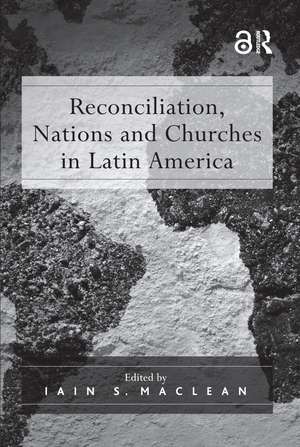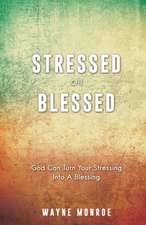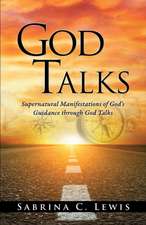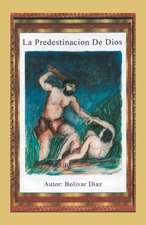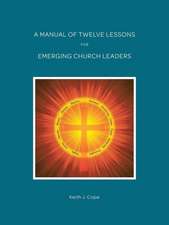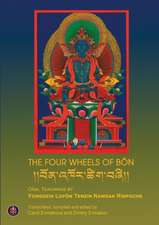Reconciliation, Nations and Churches in Latin America
Editat de Iain S. Macleanen Limba Engleză Paperback – 15 noi 2016
| Toate formatele și edițiile | Preț | Express |
|---|---|---|
| Paperback (1) | 323.23 lei 6-8 săpt. | |
| Taylor & Francis – 15 noi 2016 | 323.23 lei 6-8 săpt. | |
| Hardback (1) | 701.45 lei 6-8 săpt. | |
| Taylor & Francis – 28 mai 2006 | 701.45 lei 6-8 săpt. |
Preț: 323.23 lei
Nou
Puncte Express: 485
Preț estimativ în valută:
61.85€ • 64.58$ • 51.19£
61.85€ • 64.58$ • 51.19£
Carte tipărită la comandă
Livrare economică 05-19 aprilie
Preluare comenzi: 021 569.72.76
Specificații
ISBN-13: 9781138264717
ISBN-10: 1138264717
Pagini: 296
Dimensiuni: 156 x 234 mm
Greutate: 0.45 kg
Ediția:1
Editura: Taylor & Francis
Colecția Routledge
Locul publicării:Oxford, United Kingdom
ISBN-10: 1138264717
Pagini: 296
Dimensiuni: 156 x 234 mm
Greutate: 0.45 kg
Ediția:1
Editura: Taylor & Francis
Colecția Routledge
Locul publicării:Oxford, United Kingdom
Notă biografică
Iain S. Maclean is Associate Professor of Western Religious Thought at James Madison University, Harrisonburg, Virginia, USA.
Recenzii
'This is clearly an important work that treats a subject of great global interest. I certainly think that the book should be widely read.' John Burdick, Syracuse University, USA 'Anyone who works in postconflict situations knows the important role religious motivation and religious institutions can play in the healing process. This book provides an important benchmark for what we have been learning about the key role religion can play, and will be of immense service to anyone interested in working to rebuild conflicted societies.' Robert Schreiter, Catholic Theological Union, USA ’... this book is both timely and significant... this text is an important contribution to the study of the role that religion has played in post-conflict reconstruction in Latin America... this book should find a receptive audience among, not only politically engaged theologians, but also leaders in international governance, development and conflict resolution.’International Journal of Public Theology
Cuprins
Part 1 Nations and Reconciliation; Chapter 1 Truth and Reconciliation: Hope for the Nations or Only as Much as is Possible?, Iain S. Maclean; Chapter 2 The Mesa de Diálogo and the Fate of the Disappeared in Chile 1999–2000: National Forgiveness Without Political Truth?, Mario I. Aguilar; Chapter 3 Unspeakable Violence: The UN Truth Commissions in El Salvador and Guatemala, David Tombs; Chapter 4 The Maya ‘Greening Road’ of Reconciliation: the Pan-Maya Movement in Guatemala, Brett Greider; Chapter 5 Reinventing Life and Hope: Coming to Terms with Truth and Reconciliation Brazilian Style, Margaret Eletta Guider; Part 2 Churches and Religious Reconciliation; Chapter 6 1 Originally published in Revista Eclesiástica Brasileira, (REB) Volume 46, Fasc. 182 (June 1986), 272–314, as ‘O Tema da Reconciliacáo e a Teologia na Américan Latina’. Translated and reproduced by kind permission of the author, Padre Prof. João Comblin, and Padre Piva, the editor of REB. The editor of this volume, and translator, wishes to thank Sr. M. Guider and Carlos Viana, S.J., who checked the translation., José Comblin; Chapter 7 Social Sin: Social Reconciliation?, Margaret R. Pfeil; Part 3 Nations and Churches in the Future; Chapter 8 Living in the Wake of the Truth and Reconciliation Commission: A Retroactive Reflection, Charles Villa-Vicencio; Chapter 9 Truth and Reconciliation: From Chile to South Africa, Michael Battle; Chapter 10 Reconciliation as a Contested Future: Decolonization as Project or Beyond the Paradigm of War, Nelson Maldonado-Torres;
Descriere
This book examines the recent phenomenon in Latin America of national Truth and Reconciliation commissions. Few studies have examined the role of Churches or religion in political processes that proclaim valued theological terms as their agenda: truth, forgiveness, and reconciliation. The contributors here question the role of religion, specifically of established Churches. The impact of such reconciliation commissions on Indigenous Native Americans is also examined, as is the role of women and how both commissions and Churches or religions were challenged by their experiences.
